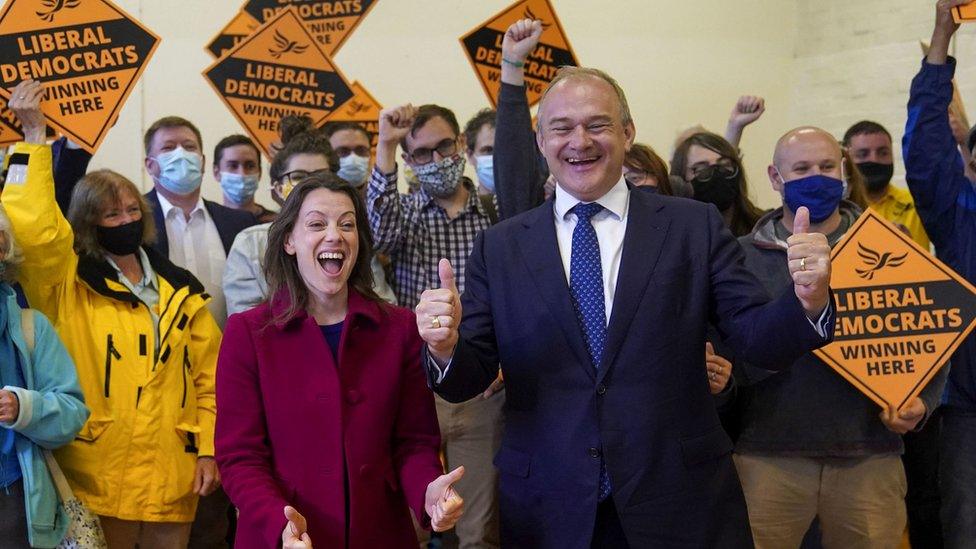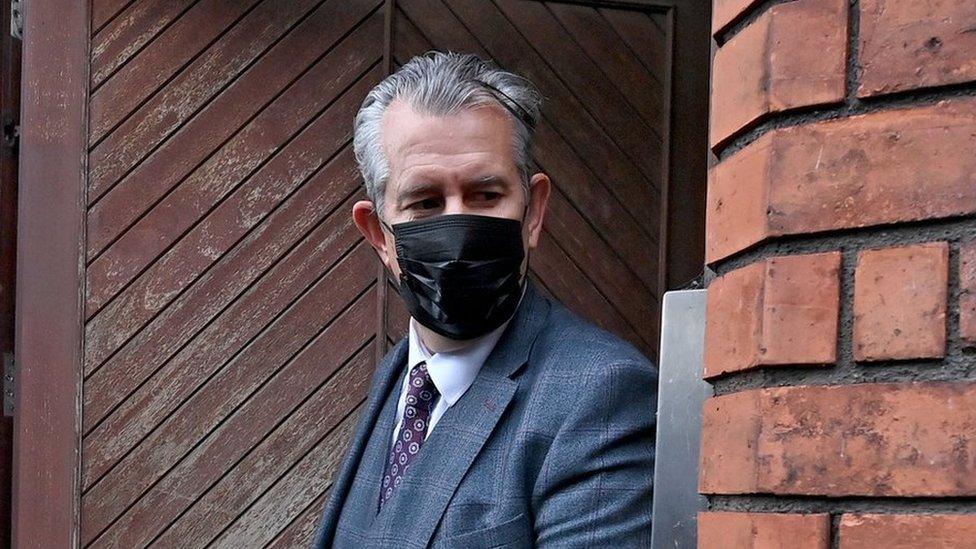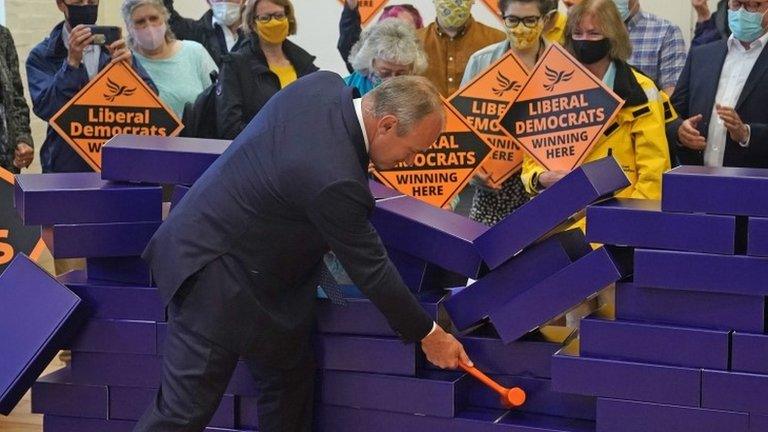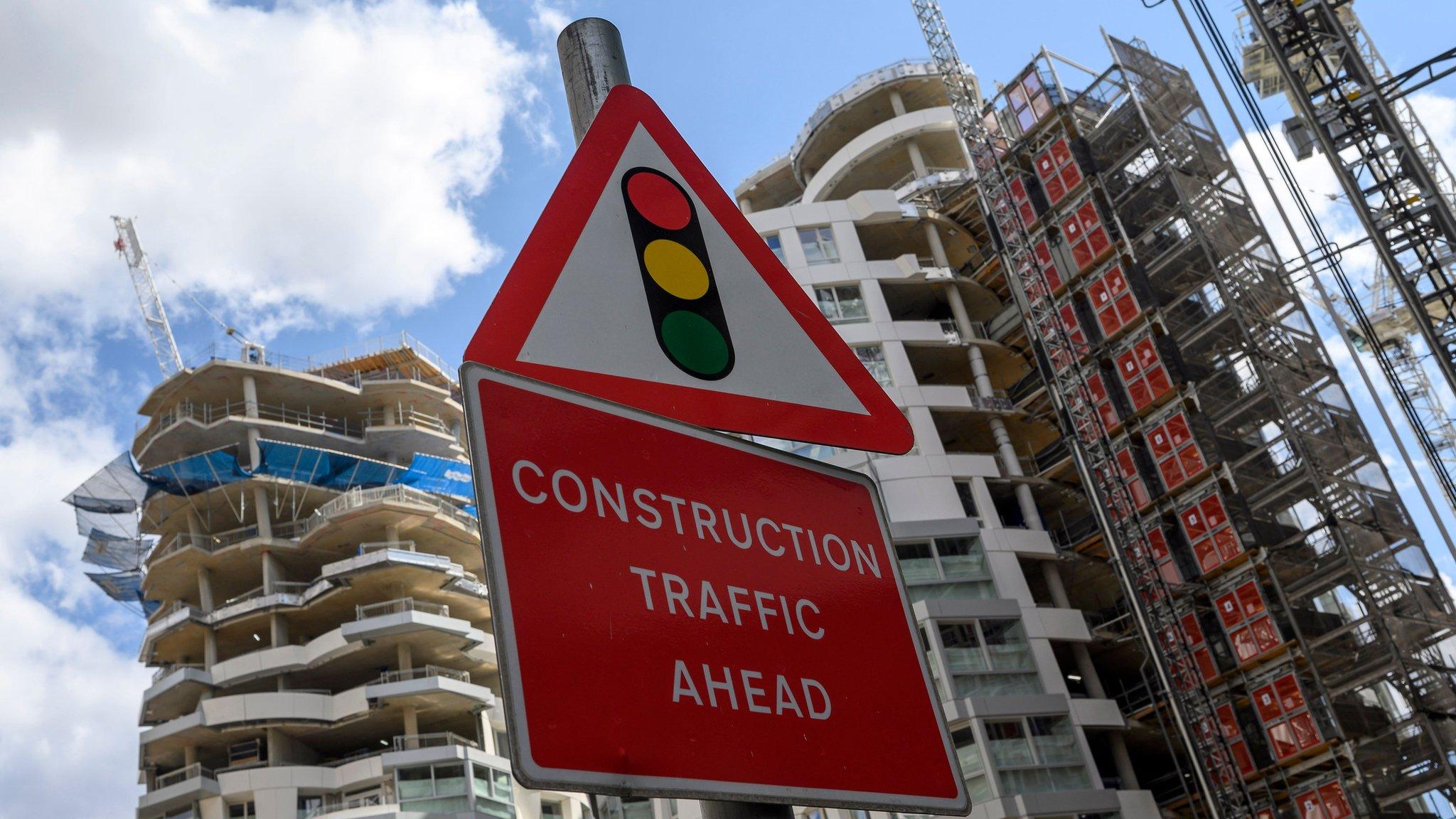The week ahead in Parliament
- Published

New Lib Dem MP Sarah Green with party leader Sir Ed Davey
By-election gains by the Liberal Democrats have been few and far between in recent years - so expect them to maximise the parliamentary theatre around the arrival at Westminster of their new MP for Chesham and Amersham, Sarah Green.
There will be a photo-call on arrival, then she'll take her seat in the chamber to ecstatic "hear hears" from the Lib Dem troops, and maybe we will even see a carefully-calibrated maiden speech.
There will be policy and political aftershocks from her by-election. Some are already speculating that it was the Tories' proposed planning reforms wot won it for the Lib Dems. Those proposals have also had a kicking from Clive Betts' Housing, Communities and Local Government Committee, and will doubtless be further monstered in Monday's Labour opposition day debate.
So might the government now seek a graceful way of dropping them?
It will be worth watching the contributions from backbench Tories and studying the words of the minister (I'm guessing Chris Pincher) very closely. And that's probably just the first of the ramifications as Tory MPs with local Lib Dem rivals sleep less soundly in their beds.
Liberal Democrat leader Ed Davey reacts to by-election win: "This will send a shockwave through British politics"
There could be ramifications for Labour too. There's an uncomfortable contrast between the Lib Dems thumping win in a supposedly rock-solid Tory seat, and Labour's tough battle to hold on to Batley and Spen in July's by-election. Keep an eye on Labour MPs arguing for some kind of electoral pact with other parties, and the reaction they attract from the leadership. That sense of the electoral ground shifting under foot is not confined to Home Counties Conservatives.
Another theme for this week and the weeks to come is the relationship between Speaker Lindsay Hoyle and the government, following rows over the lack of a Commons vote on cuts to international aid, and over major Covid announcements being made at press conferences rather than to the Commons. Things seem to have calmed down after Sir Lindsay held peace talks with the prime minister, but will their accord hold?
They're some way from the open enmity of the Bercow years, when Sir Lindsay's predecessor thwarted government plans, but the government should beware of hostility from the chair, because it could make life difficult. The Speaker could let Prime Minister's Questions and other ministerial appearances run on beyond the expected time (the most recent PMQs stretched to 41 minutes). He could allow more urgent questions when ministers made big announcements outside Parliament, and could grant more emergency debates. And he could become more willing to stretch technical points to allow awkward amendments to be put to the vote.
The actual parliamentary agenda looks fairly humdrum at the moment. But statements and urgent questions may arrive to liven things up:
Monday 21 June
The Commons opens (14:30) with questions to the education secretary, Gavin Williamson, and his team. Normally this is followed by the usual quota of post-weekend government statements or urgent questions, and they may be there this week. But the main business is an opposition day debate, and the convention is that ministers try to avoid encroaching on their time, so the threshold for allowing urgent business may be a little higher.
The debates are on planning (see above), a Labour pre-emptive strike against the government's proposed changes to the system. It will focus on protecting communities' rights to object to planning applications, which has added significance after the Chesham and Amersham by-election.
Labour are following that with a debate on safeguarding the steel industry. So one debate which plays in "Blue Wall" seats, and one which plays in "Red Wall" seats.
Monday in Westminster Hall means petitions debates - and this week's first (16:30) is on grouse shooting. The petition, which attracted more than 111,000 signatures, argues that intensive grouse shooting is "bad for people, the environment and wildlife" and is economically insignificant when contrasted with other real and potential uses of the UK's uplands.
Then (18:15) MPs will debate a 126,000 signature petition on government contracts during the Covid-19 outbreak. It calls for a public inquiry into contracts granted without a full and open procurement process.
Select committee action includes Public Accounts (14:30) returning to one of its regular subjects: the progress of HS2, with evidence from Sir Mark Worthington, the project's independent construction commissioner. and Sir John Armitt, chairman of the National Infrastructure Commission. A second session on HS2 follows on Thursday.
The super-committee on the National Security Strategy (16:00) hears from a former national security advisor to President Trump. Lieutenant General HR McMaster, who will give evidence to their inquiry into national security machinery. There will also be witnesses from Scotland and Wales who are involved with national security frameworks.
In the Lords (13:00) ministers field questions on the government's female offender strategy, attainment gaps and racial inequalities, and unregulated children's homes.
Then peers begin what promises to be an extended scrutiny process for the Environment Bill, with the first of seven committee stage days. The bill will doubtless see attempts to add all manner of extra provisions - but this is the shadow-boxing stage at which peers probe and test, rather than push ideas to the vote. That will happen when it reaches report stage consideration in September.
Tuesday 22 June
The Commons day begins (11:30) with Treasury questions. Statements from ministers or urgent questions may follow.
The main legislative action is the second reading of the Northern Ireland (Ministers, Elections and Petitions of Concern) Bill, which could become quite lively given the current political turmoil in Stormont. The bill is aimed at sorting out assorted procedural issues thrown up by the problems with the devolutionary settlement between January 2017 and January 2020, when Northern Ireland's devolved institutions were not fully functioning. It deals with ministerial appointments, extraordinary assembly elections, the ministerial code of conduct, and petitions of concern in Northern Ireland.

The political crisis in Northern Ireland caused by Edwin Poot's resignation as DUP leader will create more attention on the Northern Ireland Bill.
One important point is that, at the moment, the secretary of state for Northern Ireland is required to propose a date for assembly elections if Northern Irish ministers have not been appointed within 14 days of a previous election, or if the posts of first or deputy first minister become vacant for more than seven days. This replaces these time limits with up to four six-week periods.
In Westminster Hall my eye was caught by Conservative Claire Coutinho's debate (16:50) on the proposal for "wild-belt" designation in planning reforms. Wild-belt is a new concept for conservation proposed by the Wildlife Trust to give legal protection to new areas set aside for nature's recovery. The idea is to create wild spaces rich in biodiversity and to allow wildlife to move between biodiversity hotspots. She will focus on the importance of restoring biodiversity to combat climate change, tackle species extinction, and support public health and wellbeing.
Committee action includes Health and Social Care (09:30) concluding its inquiry into children and young people's mental health. They will hear from the minister for mental health, Nadine Dorries, and Professor Tim Kendall, national clinical director for mental health at NHS England.
Foreign Affairs (11:00) holds a special session on the UK's relationship with the EU with the government's Brexit supremo, Lord Frost.
And with the government considering privatising Channel 4, Digital, Culture, Media and Sport (14.30) has a well-timed evidence session questioning the chennel's chief executive, Alex Mahon, and chair Charles Gurassa.
In the Lords (12:00), there are questions on integrating HS2 into the government's wider railways strategy, and on protecting human rights at sea.
Then peers have their last committee stage day on the Professional Qualifications Bill.
Wednesday 23 June
MPs begin with half an hour of Scottish questions (11:30) before Prime Ministers Questions.
Then MPs turn to the Armed Forces Bill, which provides the legal basis for continuing the existence of the Army, Navy and RAF. It reaches the chamber after having been scrutinised by a special select committee.
Westminster Hall action includes Tyneside MP Chi Onwurah celebrating 100 years of the Tyne Bridge (11:00) and former cabinet minister Chris Grayling on deforestation in the Amazon (14:30).
On the Committee corridor, the Northern Ireland Committee will have plenty to discuss with secretary of state, Brandon Lewis (09:30); Work and Pensions (09:30) quizzes minister Will Quince about measuring child poverty, and Education quizzes Secretary of State Gavin Williamson.
Defence (14:00) has a session on defending global Britain in a competitive age, with Defence Secretary Ben Wallace, the star witness.
Environmental Audit (14:30) hears evidence on water quality and pollution in rivers from officials at the Environment Agency, Ofwat and Highways England. In early sessions of this inquiry, they heard about the threat sewage discharge, plastics and run-off pose to biodiversity and human health.
In the Lords (12:00) there's the rarity of a question about the use of folic acid that is not asked by Labour's Lord Rooker. This time the questioner is the DUP's Lord Dodds. And the former defence minister, Lord Trefgarne, asks if the UK intends to maintain a continuous at-sea nuclear deterrent.
Then it's back to the detail of the Environment Bill, with day two of committee stage consideration.
Thursday 24 June
The Commons starts (09:30) with Transport questions, followed by the weekly announcement of the forthcoming agenda by Leader of the House Jacob Rees-Mogg.
The main debates are on two subjects chosen by the Backbench Business committee - first the Comprehensive and Progressive Agreement for Trans-Pacific Partnership, a trade agreement the UK is seeking to join, and then on UK defence spending.
In Westminster Hall there are debates on community champions (13:30) and then on support for the aviation, tourism and travel industries (15:15).
On the committee corridor, Public Accounts have another bite at HS2 (10:00) this time quizzing senior civil servants from the Department for Transport.
In the Lords (12:00), questions cover ensuring that the criminal justice system treats deaths and injuries caused by motorists equally to those not caused by motorists, and there are two Lib Dem backbench debates, on social care and on promoting tourism in the UK.
Friday 25 June
The Commons is not sitting, but peers are making a start on their new crop of private members bills (11:00). These are bills proposed not by the government, but by individual peers. The Big Issue founder Lord Bird is having another go at passing his Wellbeing of Future Generations Bill, which attempts to build longer-term thinking into all government policy.
Then there's the Office of the Whistleblower Bill proposed by the Lib Dem former minister, Baroness Kramer. This seeks to establish an independent body to protect whistleblowers - people who raise concerns about the way organisations are behaving. The bill picks up the recommendations from the 2019 report by the All Party Parliamentary Group on Whistleblowing, of which Baroness Kramer is co-chair, which found that the existing law "has failed to provide adequate and comprehensive protection to whistleblowers or the public."
Finally, there's the Higher Education Cheating Services Prohibition Bill from the Lib Dem Lord Storey. This sets out to curb online "essay mills". The former universities minister Chris Skidmore, presented a bill on this issue a few months ago.
- Published18 June 2021

- Published18 June 2021

- Published21 June 2021

